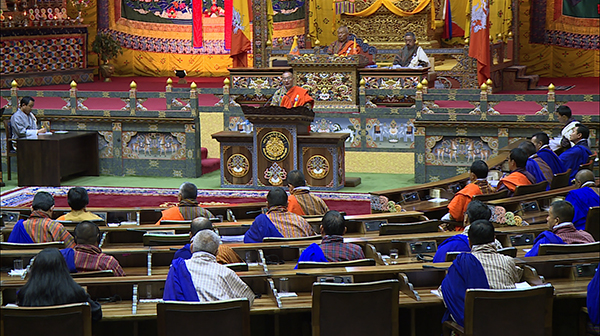 Presenting the State of the Nation Report, Prime Minister Tshering Tobgay also highlighted the state of five economic jewels.
Presenting the State of the Nation Report, Prime Minister Tshering Tobgay also highlighted the state of five economic jewels.
Hyrdopower
Prime Minister Tshering Tobgay informed the sector generated revenue of Nu. 7B last year. Regarding the five hydropower projects under construction, Lyonchhen despite some delays and challenges said its on track. With the completion of the projects – Mangdechhu and Nikachhu in Trongsa, Punatshangchhu I and II in Wangdue Phodrang and Kholongchhu in Trashi Yangtse- a total of 3,658 MW of hydropower capacity will be added to the existing installed capacity of 1,606 MW.
Meanwhile, Lyonchhen said that Kurichu Hydropower plant in Monggar repaid its loan last year. Likewise, for Tala Hydropower plant in Chhukha, its debt will be liquidated by 2018.
Most of the hydropower projects in the country are joint venture undertakings between the Royal Government of Bhutan and the Indian counterpart.
Agriculture
As per the GNH survey, farmers are less happy compared to those in other professions. This is mainly because they face long working hours under unpredictable weather conditions and damage to crops and livestock by wildlife. Lyonchhen said the government is implementing policies and plans to improve agricultural productivity and profitability of farmers.
“The government continues to focus on constructing and maintaining farm roads for the benefit of our farmers,” Lyonchhen added. The government is also focusing on construction of irrigation, distribution of seeds and seedlings, and green houses, farm mechanisation and installation of electric fences.
As per the report, compared to 2013, the country saw increase in both agricultural and livestock productivity last year.
Tourism
Tourism, Lyonchhen reported, continues to be an important industry for Bhutan. It not only generates revenue but also creates employment opportunities. Apart from Nu. 1.3B revenue for the government in the form of royalty and taxes, the sector today employs over 25,500 people.
However, Lyonchhen said the country’s tourism policy of ‘High Value, Low Impact’ is still valid and important. “Our economy is just growing and our limited infrastructure can absorb only a certain number of tourists.”
As a counter-measure, the government will soon come up with guidelines to regulate the policy.
In 2015, over 141,000 tourists visited Bhutan. Of it over 51,600 were international tourists and the remaining, regional tourists. Regional tourists are from the Maldives, India, Bangladesh and Nepal.
Cottage and Small Industries (CSIs)
Last year alone, 1,355 new CSIs were established. “More CSIs increases productivity, broadens the economic base and promotes balanced development in the country,” said Lyonchhen.
To encourage Small and Medium-sized Enterprises (SME), Lyonchhen added, the government recently established a new State Owned Enterprise- Rural Enterprise Development Corporation Limited (REDCL). Once the central bank finalizes guidelines for SME banks, the REDCL will function as an SME bank.
Today, there are 16,548 CSIs in the country.
Mining
Lyonchhen reported that the government initiated two important developments in the mining sector. The Mineral Development Policy will be finalised this year and mineral rent and royalty is revised after a decade. The revision is expected to enhance the government’s revenue by Nu. 129M.
Lyonchhen said the government will continue to focus and take advantage of economic potentials lying in these five economic jewels. “To do so, the government is strengthening private sector by making business environment more conducive,” Lyonchhen added.







